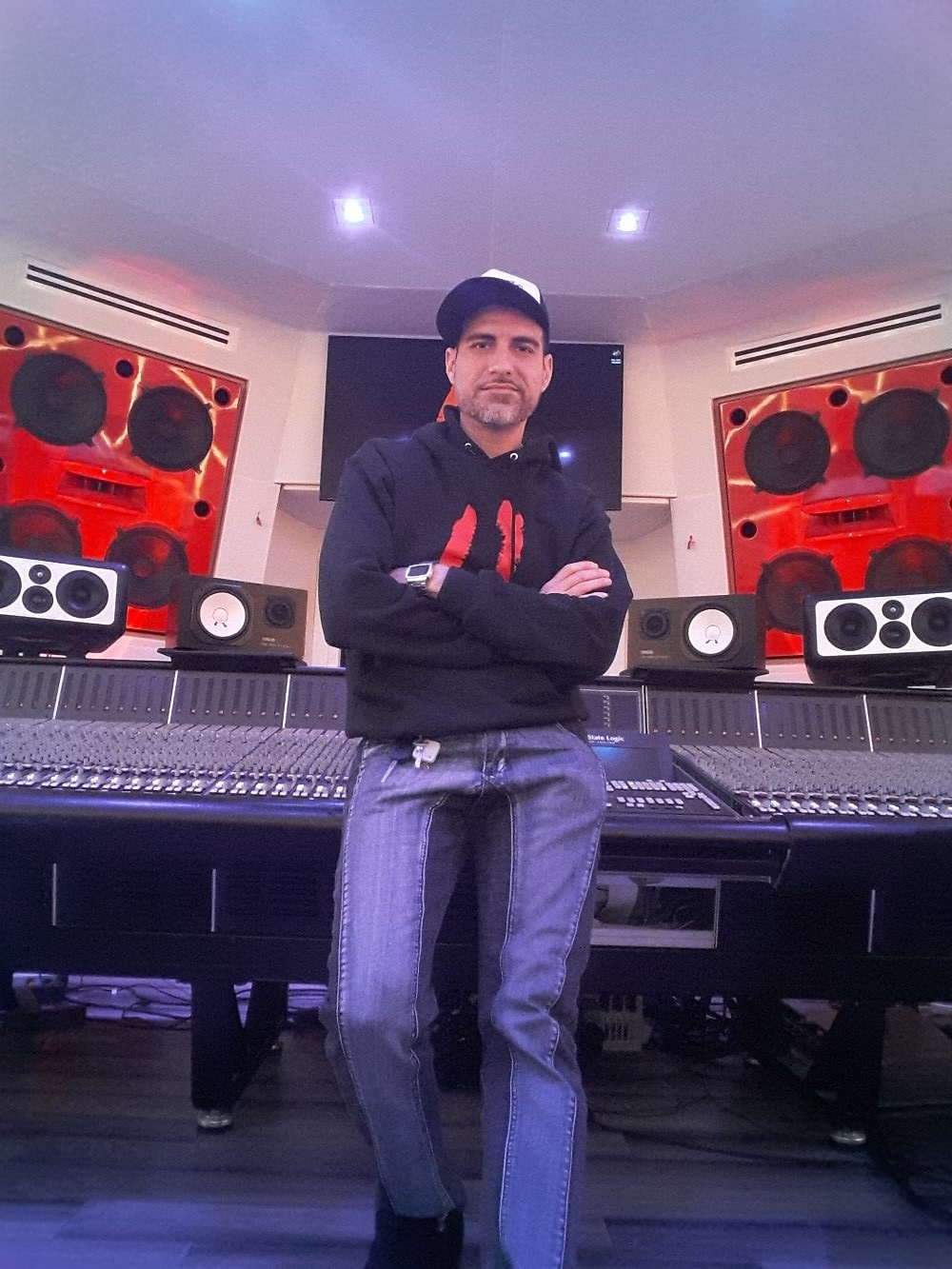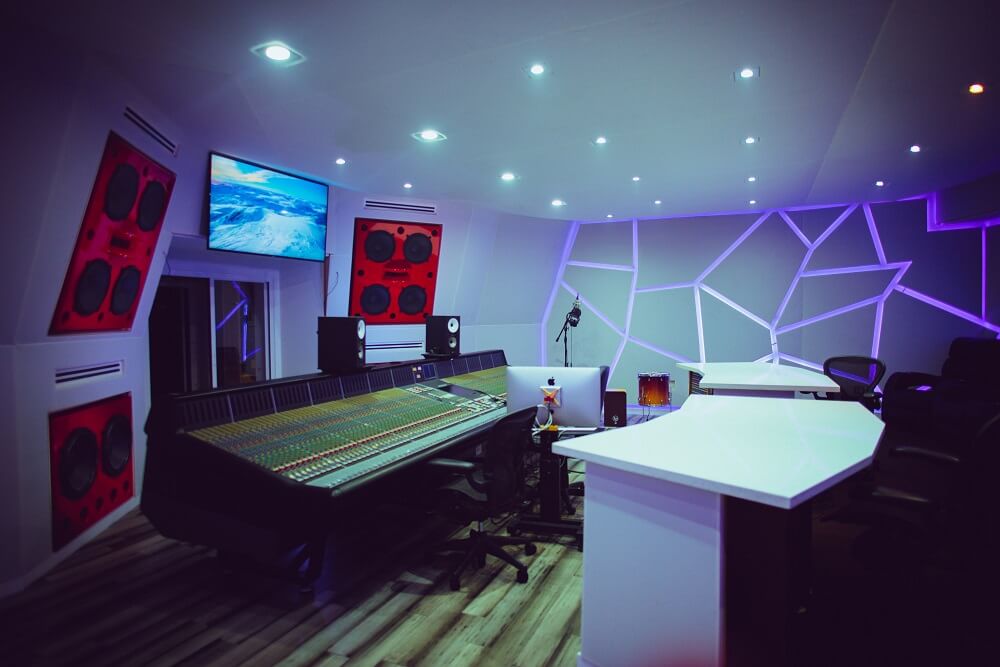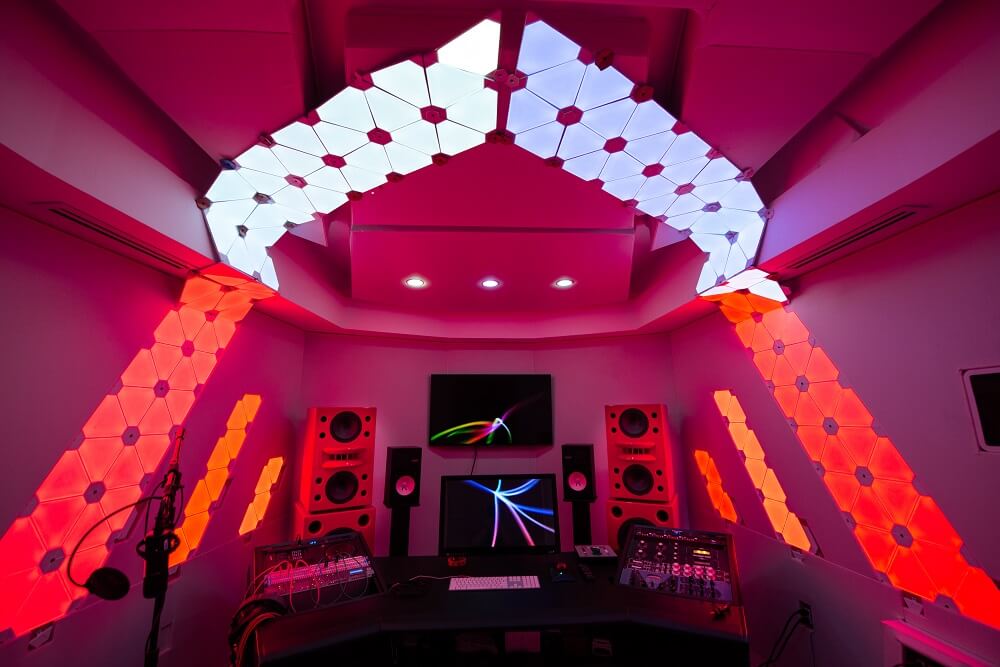
Recording Connection mentor Rene Reyes at Rebel 11 Studios (Miami, FL)
Producer/Engineer Rene Reyes of Miami’s
Rebel 11 Studios (Bad Bunny, Darrel, Karol G) isn’t one to varnish the truth. He’s passionate about making music, helping artists capture the sounds and sonic feel they’re after, and achieving a life/work balance that sets one on course for a productive, rewarding career. Naturally, we just had to download some of his wisdom to share with you, so read on!
So how did you get into producing music? What was your path into it?
“Even before I knew how to play any drums, I remember being the annoying kid that everybody would say like, ‘Stop!’ because I was always like [tapping on things]. My mom and aunts would be like, ‘Can you please stop, Rene?’
[So] I started as an artist playing drums. I was always drawn to music. Way back in elementary, I was playing in the symphonic band. And then in high school, marching band. I did drum corps in college, I did drum line.
So then I got into DJing. Then once you get into DJing, you’re constantly just analyzing the music, and then you want to get behind the scenes in that aspect. So then, that’s how I got into production…Once I was in production land, I started wondering, you know, more about the technical part of it, right? So I was very technically inquisitive the whole time as to how these sounds were being made.”
Tell us about Rebel 11 Studios. What can students expect to encounter there?
“We have a very tight knit team and we all wear different hats, according to what needs to get done to ensure that business runs smoothly and that the client is happy…. I started [here] when this studio behind me was just a big warehouse and I came in and said, ‘What do you guys need? Let’s do it.’ So I was hammering nails and screwing for a year in a half. I’d never built a studio from scratch. It was quite a humbling experience. Once the studio started taking shape, then I started wiring…
We have 3 different studios in the facility. All of them have a slightly different approach as to the workflow and what they’re designed for…A Room is our deluxe package. It can handle high occupancy sessions and is equipped for recording/mixing/mastering. B Room is our hybrid with high-end industry standard equipment for recording and mixing. C Room is our budget-friendly room used more often for pre-production, writing, and some preliminary recording. All three rooms are also designed for and regularly used for photoshoots. All RRFC students will have regular exposure to every room and piece of equipment in the building.”

Rebel Flagship Studio A (recording/mixing/mastering)
“They just kind of see my passion and it brings it out in them…I go to town on all of the things that are going through my head. Also at this point, I’ve learned when to stop and maybe move on to the next thing. What I really like about this school, the process we do, is that we use the test that the students do every week for their chapters as a guideline as to what the focus of that day is. And so, I try to stop myself and not go too deep because it might be something that we cover later on. And then, you know, I find some balance with that…I try to keep that engagement with them [and] to remember when I was in their shoes.”
How long have you been teaching for?
“Fifteen years, over 15 years now. I taught at Full Sail for 4 years, Los Angeles Recording School for about 8 years. I’ve been teaching with
you guys for a while.”
What’s your advice for students on how they can make the most of their time in Recording Connection?
“Just practice, practice, practice. Make sure you have a good balance with the rest of your life too because it’s very easy to get pulled in….[I]t does have that kind of addictive element [like video games], so you can lose track of time really quickly. That took me awhile because for a long time, since I was teaching, I could afford getting lost in the studio for hours and days. But eventually, if you’re doing this for business and for money, then time will become a top priority. Being able to work fast but being able to work relaxed and able to provide that relaxed atmosphere [while] you’re working really fast is very important.”
Any advice for newbies on setting up their workflow within the Pro Tools environment?
“Make sure you develop a good working template and label everything. The routing is important. Color coding is very important. Make sure that you are using plugins that you’re going to be able to instantiate in other studios that might not have those plugins. If you’re not sure, just use the stock Pro Tools plugins so that you don’t find yourself opening up your template in a studio that doesn’t have those plugins, [if not] then that’s a can of worms that you will have to deal with.
Also, make sure that you think of it as concepts, right? So, you don’t have to use only the one delay that you know very well. Understand that most delays are going to work exactly the same: reverbs, compression, so that you’re not stuck and caught, you know, running around like a chicken with its head cut off, if you don’t have the one plugin that you’ve mastered. So it’s very important to think of it in the sense of [understanding] these concepts….That’s going to save you a lot of time.”
So why do you choose to mentor with us?

Rebel Writing Studio C (pre-production/songwriting)
“I think the concept is genius. It’s essentially like the Uber of schools. It puts you directly in the end result of what you think you might want to do. So it serves several purposes. It doesn’t educate on what you think you
might want to do but it also exposes you to maybe what you thought you might want to do and now you realize there’s this other avenue that looks more appealing, just based on being around the professional aspect [of it]. That’s something that I found missing in the schools that I would work with before. You know, kids would go for years, digging into the books. I find nothing necessarily wrong with that. Knowledge is knowledge and you get out of it what you put into it but the exposure aspect of it is different; what this program does is flipped it. It puts you right at the end result and at least allows you to see, you know, in some cases, [that] this is not for everybody.”
So what, in your opinion, does it take for someone to be a professional music producer?
“Production has a way of getting in your head in a way that can be detrimental if you don’t understand the mental discipline you need. There’s a lot of technical parts to it, there’s a lot of boring parts to it that you just can’t get around. Nowadays with technology, that gap is shrinking, you know? It’s becoming easier and easier to create a dope beat. But what does it take to create something that’s special, that’s maybe, you know, [what] I like to call timeless music, right? Something that you’re going to hear fifty years from now and you’ll be like ‘Wow, it still holds its own!’ I think to be able to tap into that, it definitely takes some level of maturity that needs to happen inside you….You need to understand the balance between the right side of your brain and the left side of your brain and the creative, fluffy land of unicorns and the ‘I need to be done by the end of this week. I can’t be playing on this song that makes me feel great for the next 4 months.’
You can play with it for 4 months, if you want, and it can make you feel great but if you never finish it and you never get it out to the record label or playable in the club and get it out to DJs, it never sees the light of day, then it’s more something that you’re doing for yourself, which [there’s] nothing wrong with that but as far as being a producer, a
professional producer, you have to learn that objectivity aspect of it, and when you have to turn off the heart and just kind of just deal with the numbers and the math and the physics. And finding a good balance between the two, I think, is really important.”
Want to learn how you can train with Rene Reyes or any of the other talented Recording Connection mentors?
Get started here.
* * * * *




